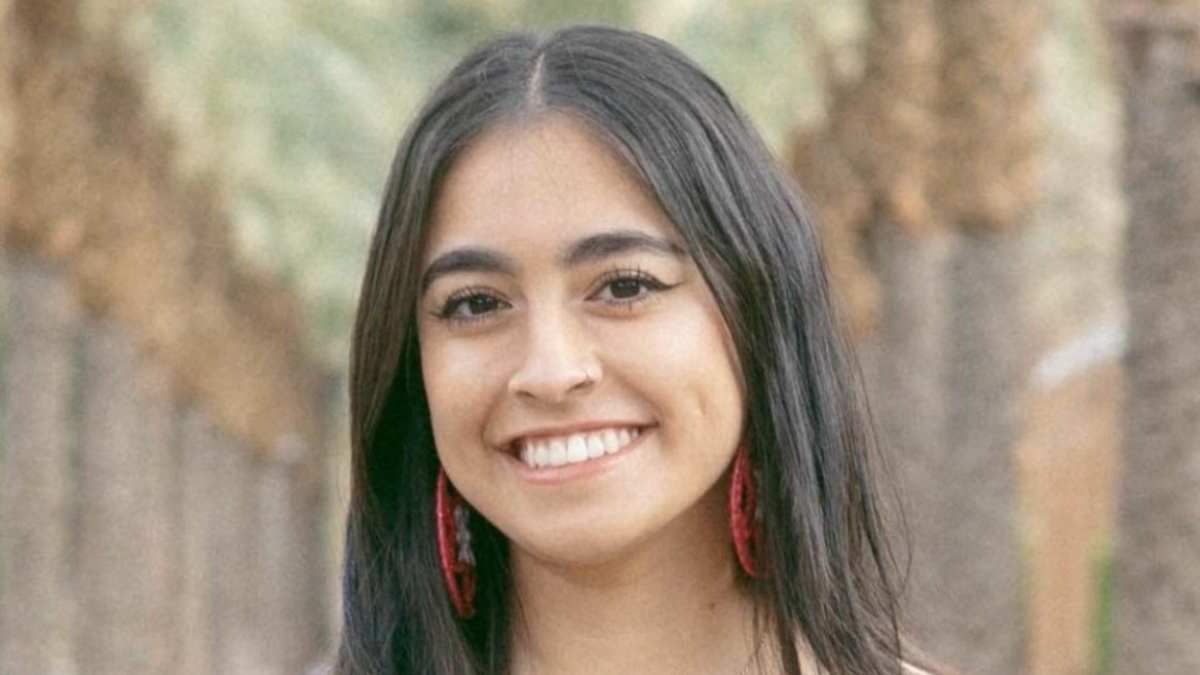Family’s experience with law enforcement led grad to choose career in criminal justice

Yoselin Flor-Aguilar, spring 2024 Watts College Outstanding Graduate, School of Criminology and Criminal Justice. Courtesy photo
Editor’s note: This story is part of a series of profiles of notable spring 2024 graduates.
Perhaps ironically for Yoselin Flor-Aguilar, her family’s fear and avoidance of law enforcement officers led her to study criminology and criminal justice.
“Even if they faced victimization, they would take every precaution to avoid law enforcement,” said Flor-Aguilar, the Spring 2024 Outstanding Graduate in the School of Criminology and Criminal Justice, part of the Watts College of Public Service and Community Solutions.
“This made me realize that not only could my family be experiencing it, but other Mexican and Hispanic households could be encountering the same thing.”
A career in criminal justice, she reasoned, could allow her to bring them a sense of security “by knowing that someone with the same cultural background and possible understanding is involved in the system.”
An interest in the corrections system, which blossomed during a first-year course on the subject, also spurred her choice.
“I was unaware what recidivism was until I took an interest in corrections. It may have been because I wasn’t too educated on the topic,” said Flor-Aguilar, who earned a Bachelor of Science degree in criminology and criminal justice and was enrolled at Barrett, The Honors College. “But it blew my mind to know that our system wasn’t doing much to reduce recidivism, especially since the U.S. has such a large incarcerated population.”
Flor-Aguilar said she believes the justice system’s historic practice of creating harsher conditions inside correction facilities isn’t going to change the criminal habits of many experiencing incarceration.
“The reason (it won’t change) is, for most of their lives, many lived in a cycle of crime. Crime is all they know,” said Flor Aguilar, who noted that many people experiencing incarceration also have endured trauma or struggle with mental health issues. “Making prison harsher isn’t going to change things.”
Flor-Aguilar refers to a statistic she learned from a guest speaker who visited one of her classes. The speaker, from New Freedom, a Phoenix rehabilitation center for people emerging from incarceration, said since the center opened in 2021, 95% of all formerly incarcerated persons it helped did not commit new crimes. The speaker’s presentation encouraged Flor-Aguilar to become a New Freedom volunteer.
Flor-Aguilar, who is from Phoenix’s South Mountain Village neighborhood, is also a student in Barrett, The Honors College.
Read on to learn more about Flor-Aguilar’s ASU journey.
Note: Answers have been edited for length and clarity.
Question: Which professor(s) taught you the most important lessons while at ASU?
Answer: Two courses taught valuable lessons that have stuck with me.
The first was an Introduction to Corrections class taught by Instructor Patricia Barnhart. It taught me not just about prisons and how they operate, but also about the detrimental impacts of incarceration and how it may lead to recidivism. This lesson was extremely important to me, as it altered my perception of how prisons operate and their effectiveness in decreasing crime.
Assistant Teaching Professor Claudine DeCarolis’ course, called Race, Ethnicity, Crime, provided valuable insights into the correlation between an individual's race and ethnicity and crime. As a Hispanic woman, I had an interest in learning more about it. One important thing I learned was that based on the population of each racial or ethnic group, crime rates are different, and they can't really be compared to one another due to the disproportionate populations. I also learned that in most research, Hispanics are placed in the White racial category, making statistics a bit unreliable.
Q: What’s the best piece of advice you’d give to those still in school?
A: Do not give up! College is difficult; I know it is, especially if you have a part-time job and you are a first-generation student with family obligations. Some students may experience homesickness or mental health issues, but regardless of the situation, when you reach your lowest point, ask yourself: What was your initial motivation for attending college and what is your ultimate goal with your major? Rethinking what drew you to college should remind you of why you went there in the first place. This should boost your motivation by inspiring you to persevere in the face of adversity.
Additionally, pray to God for bravery and peace because he is our provider, and we are held by him and only him. No matter how difficult college becomes, remember that you will make it through one way or another. All you have to do is have faith that the Lord is directing you in the right direction, and you have to persevere no matter how difficult things get. (Psalms 37:24.)
Q: What was your favorite spot to study, meet friends or to just think about life?
A: Completing assignments at home has been a challenge for me. As a result, I developed a habit in which I studied and did assignments in coffee shops. Furthermore, meeting with friends at coffee shops is one of my favorite things to do. From my perspective, coffee shops give me the emotional intention to complete work and catch up on things, whether it is keeping up with assignments or catching up with a friend whom I haven’t seen in a while.
Q: What are your plans after graduation?
A: I plan to further my education by earning a master's degree in crime analysis. Thanks to the options available at ASU, I was able to apply to the 4+1 master's program, where I began attending master's-level classes during my senior year. While pursuing my master's degree, I intend to secure an internship at a law enforcement agency to gain hands-on experience in crime analysis. After graduating with my master’s degree, my ultimate goal is a job with the FBI and move to the East Coast, more specifically, near Washington, D.C.
Q: If someone gave you $40 million to solve one problem on our planet, what would you tackle?
A: I would provide the funds to a nonprofit organization that would help children and families that are in ICE detention in need of legal representation. The United States has the largest immigration system in the world, in which children and adults are detained and denied access to a court-appointed attorney, a free phone call or a speedy trial. Children and adults, regardless of their immigrant status, deserve the right to a fair trial with the right of a lawyer. I would provide the $40 million fully to that cause.
More Sun Devil community

Tested tips for taking exams
With May quickly approaching, many students are starting to prep for their most important tests of the year — final exams.Toni Miceli, the inaugural director of the bar exam success program at…

School of Transborder Studies celebrates 15th anniversary
During the summer before his freshman year at Arizona State University, Salvador Macias participated in the AGUILA Youth Leadership Institute, a college access organization designed to help young…

Barrett program unlocks study abroad for first-year honors students
Twenty first-year students from Barrett, The Honors College at Arizona State University are spending their second semester studying abroad in Rome, Italy.Traveling in a tight-knit honors community…

